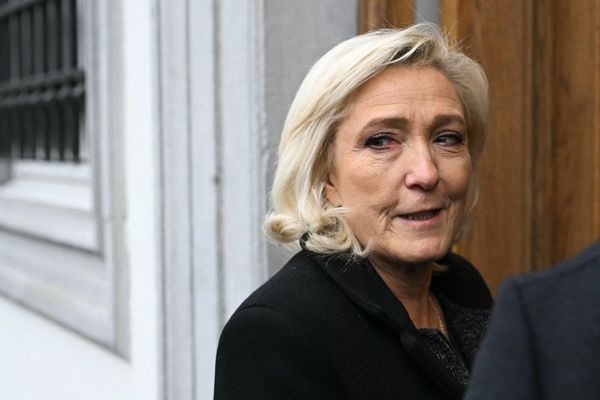
The first anniversary of the October 7 Hamas attack on Israel was followed by another first anniversary: the collapse last year of the proposed Israel-Saudi Arabia peace agreement. Due to be signed in October 2023, the proposal had followed agreements with UAE and Bahrain, but they were mere prelude. The Saudi agreement was to be the big one. It would mark an end to something that had been withering for decades: pan-Arabism and solidarity with the Palestinians.
The widening divisions were in part diverging fortunes. The Arab monarchies were no longer ex-colonies or client statelets that had struck it rich. They were now high-tech surveillance cities, much like Israel, invested in ultra-tech possibilities. Whatever popular solidarity remained with the Palestinians on the Arab “street”, it was not shared by their leaders.
But all that was the mere precondition for the deal’s main purpose: to consolidate a bloc in preparation against Iran, a Zionist-Sunni alliance against the centre of Shi’ite Islam. The agreement would have sealed off possibilities for the Palestinians and reoriented the Middle East.
It seems obvious the October 7 attack was designed to make the Israel-Saudi agreement impossible — and it was indeed later discontinued as a renewed anger built across the Arab world and leaders became fearful of their people. The core of the Hamas raid appears to have been directed at Israeli military targets, but the civilian atrocities were presumably part of the plan: to instigate an event that could not be negotiated away.
The conclusion must surely be that Hamas succeeded in its aims, even if the blowback — the destruction of Gaza — has been more than it might have anticipated. Israel has now extended itself to the decimation of Gaza, a de facto war with Lebanon, raids and strikes on Syria, and a coming major assault on Iran.
It’s worth stepping back a bit and realising how extraordinary this is. Israel is now fighting on more fronts than any war since the nation’s 1948 founding, when Zionists unilaterally declared the state and territorialised it using internal terror and ethnic cleansing against the Arab population. A consolidation of its position has been reversed. Within that, plans of “Greater Israel”, a strategy conceived of by the Israeli mainstream as the work of decades or a century, have been pushed forward. Israel is already overextended, both politically and militarily.
With conflict opened up, the most extreme elements of Zionism have been unleashed and are moving to the centre of Israeli political life. Israeli government ministers have spoken of not merely occupation and expulsion but also the extermination of Palestinians. This is what Benjamin Netanyahu and his party Likud wanted — to say otherwise is to have false apprehensions of moral limits.
But Netanyahu is a transactional politician, whose decades-long support for Hamas as the power in Gaza has long been a scandal in Israeli politics. His attempt to destroy it now — as if Hamas were a single gang you could eliminate and not a movement already recruiting a new generation — is gangster logic: covering up one’s mistakes and ensuring one’s position by the creation of a permanent crisis.
In Israel, demonstrations against the Netanyahu government — by the hostages’ families and others — regularly say and do things that would have them arrested and jailed for years in allied countries. One doesn’t need to get all misty-eyed about “the Middle East’s only democracy”, or nurture any illusions about the views of many Israelis, to see the paradox.
A state involved in multiple conflicts is not wholly shutting down dissent — although it is shutting down Arab dissent, and basic journalism, as with its forced closure of Al Jazeera — in part because it is in actual conflict. In the West, a culture in the doldrums, with a political right in existential crisis, Israel has become a unity to represent all the ideals “Team West” is projecting onto our battered, superseded, self-undermined entity.
That has created what can only be called a political hysteria, in the literal medical sense. Hysteria is, among other things, to treat any signifier as the thing itself. In hysteria, a dark patch on your arm is a melanoma, even if it turns out to be a stain on your shirt sleeve; a non-response to a text is the end of a relationship. And so it goes. For the hysteric, there is no gap and mediation in social life, no middle space. It’s all or nothing.
This has become the character of much right-wing and centrist responses to the events of the past year, and to its discussion here. In the 1970s and ’80s, when Palestinian small-group terror was smaller in scale but more frequent and far more globally distributed, there was some capacity by the pro-Zionist right to speak of it in strategic terms and as a political movement.
But that was amid the Cold War, as well as genuine left-right class and program struggles within Western societies. That is gone now. Politics has receded behind administration, the social has yielded to the psychological, and so the vacuum is filled with the language of trauma, pain and individual subjectivity damage.
Thus, a slogan like “From The River To the Sea, Palestine Will Be Free” is not assessed or replied to as a political claim with multiple interpretations. One interpretation, the least plausible — that of the extermination of Jews in the Middle East — is chosen as the “true” meaning of the term. It is then defined solely in terms of its psychological effect on those who hear it, and redefined not as speech but as a real assault, doing damage. A case is then made for banning it. That is political hysteria in its essence.
In the year since October 7, political hysteria has become the dominant motif of Zionism and the political right. That Jewish people everywhere would be angered, depressed and agonised by the Hamas attack and its memory is absolutely right, understandable and inevitable. But the experience of it is being moved to the centre of global discourse.
This results in two paradoxical occurrences. Firstly, it plays into a discourse from which Zionism was trying to escape: that of Jewish people as not merely historically circumstantial victims but permanent ones. There have been mercifully few incidents of antisemitic violence in Australia since October 7, though there has undoubtedly been an increase in verbal abuse.
But the Executive Council of Australian Jewry’s antisemitism count — the methodology and sub-categories of which are never made public — lumps all events together and includes many incidents that are simply political exchanges between pro-Palestinians and activist Zionists. The campus pro-Palestine encampments were held to be responsible for “anxiety” that Jewish students might feel. And so on.
This has been bizarre, because it has played into European misconceptions of Jewishness that Zionism was created in part to dispel: the idea, especially in northern European cultures, that Jews are inherently hysterical, prone to panic, anxiety, etc. Even Theodor Herzl, the founder of Zionism, had some agreement with this, arguing that one purpose of Zionism, beyond gaining a landed nation, was to curtail the negative effects of ghettoisation and victimhood allegedly manifesting in Jewish character.
From the 1930s and through into the 1990s, this refusal to draw on personal trauma, sensitivity and unchangeable victimhood was central to Zionism. Israeli military leader and politician Moshe Dayan and others could recognise the justice of Palestinian claims to being oppressed, and the moral right to use terrorism to fight, because the Palestinians did so from a position of refusal — the mere fact of a just claim didn’t mean it would be honoured.
But as Israel has become a nuclear power, and abandoned any sort of larger deal, that political defence has been worn away. The capacity to be martial, Spartan, collective and sacrificial has been undermined from within. The responses of Jewish diaspora and Israelis now oscillate between traumatised mourning and melancholy, a manic punchiness and an overconfidence in Israel’s military capacities, which appears to have started to drive Israeli state responses, amid Israel’s retail political character.
Jewish Zionists don’t know whether to take on the victimhood stance, the military supremacist stance, or both, which is how you get bizarre articles like novelist Howard Jacobson’s, published in The Guardian, which argued that the outcry about the deaths of thousands of Gazan children killed by IDF bombing is best seen through the prism of the medieval “blood libel” myth: that rabbis murdered Christian children to use their blood in rituals.
Jacobson, a one-time literary critic, capable of talking about the rhetorical strategies by which texts are made, has thus come to this position: the act of pointing to the real killing of children by the air force of a Jewish state is the moral equivalent of accusing Jewish people of a fictional atrocity for magical purposes. Go to Cambridge and learn to think this clearly.
Non-Jewish Zionists, such as the majority of the editorial staff at News Corp, are getting something different out of this. For decades, “plucky little Israel” has stood for a West whose assertion of self and values has become increasingly half-hearted and then absurd. Now Israel is all they have. There is calculation in the deployment of public emotionality by such figures, but they are also attached, too.
Thus, Paul Kelly’s perpetual Chicken Little act about the fall of Western civilisation fits easily into a narrative in which Israel and Zionism stand where Christianity once stood, and anything else is negated. The Australian’s black-bordered weekend edition on the October 7 anniversary, devoid of any account of events from the Palestinian side, or the suffering of their innocents, was genuinely pathetic.
Sycophantic rather than honouring, overwrought and needy, it showed the other paradoxical feature of what one might call gentile philozionism: the need to have Jewish people as someone to protect. There is, in this endless stream of drivel from the Gemma Togninis, Peter Hartchers and others, no true equal respect and recognition of Zionist Jews.
Respect of another implies treating them as an autonomous agent, not merely as a victim whose actions cannot be morally weighed. The gentile philozionists treat Zionism and Israel as a child they’re proud of and will protect from moral scrutiny and examination. Amid all the death and destruction, we are, bizarrely, at the “you’re doing great, honey” stage of the conflict.
How far will this take us? Israel only ever had military control of this mega-event, and now it is losing that. It has never had political control. Hamas has started firing rockets back into southern Israel, a year after the operation began to “eliminate” it. Whatever the response will be, it will simply further draw Israel in. Gaza is becoming its Iraq, its Vietnam. Heightening the brutality — mass bombing-levelling of the whole of the northern half of Gaza, and a no-go desert policed by shoot-to-kill-drones, for example — will simply oblige attack by other agents, even as they know that Israel’s response to them may be multiples of force.
Every battlefield victory for Israel appears to be a fresh loss. A few more successes and defeat will be total — or it will need to fast forward to a version of a Greater Israel, and even more of a garrison/missile state than it is now, moving permanently into parts of Lebanon and Syria, and approaching mass transfer of West Bank Palestinians into other territories or camps within the West Bank.
The killing of Palestinians, and Gaza, is genocidal now. But this is all being done under an “Iron Dome” that is neither a dome nor of any solidity — it is an electronic military system, as fallible as any, and Israel is sheltering under, in the last instance, a persuasive metaphor.
Magical thinking has infected strategic thinking. The situation is heading towards nuclear exchange, cheered on by a Western establishment that has lost both morality and mind. And it all began with a lethal raid on motorbikes.
Where do you fear the war in the Middle East may be heading? Let us know your thoughts by writing to letters@crikey.com.au. Please include your full name to be considered for publication. We reserve the right to edit for length and clarity.







